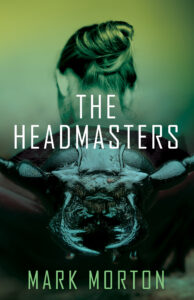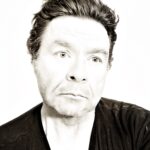Young adult author Mark Morton joins me today to chat about his new YA dystopian novel, The Headmasters.

Bio:
Mark Morton, author of The Headmasters and Cupboard Love: A Dictionary of Culinary Curiosities (nominated for a Julia Child Award), is also the author of three other nonfiction titles, The End: Closing Words for a Millennium (winner of the Alexander Isbister Award for nonfiction); The Lover’s Tongue: A Merry Romp Through the Language of Love and Sex (republished in the UK as Dirty Words),and Cooking with Shakespeare. He’s also written more than 50 columns for Gastronomica: The Journal of Food and Culture (University of California Press) and has written and broadcast more than a hundred columns about language and culture for CBC Radio. Mark has a PhD in sixteenth-century literature from the University of Toronto and has taught at several universities in France and Canada. He currently works at the University of Waterloo. He and his wife, Melanie Cameron, (also an author) have four children, three dogs, one rabbit, and no time.
Welcome, Mark, please tell us about your current release.
The Headmasters is a 120,000-word, Young Adult, dystopian novel set in a remote location in the not-too-distant future in the Canadian Shield. Here’s the “blurb” from the back cover:
How do you learn from the past if there isn’t one?
Sixty years ago, something awful happened. Something that killed everyone except the people at Blue Ring. Something that caused the Headmasters to appear. But Maple doesn’t know what it was. Because talking about the past is forbidden.
Everyone at Blue Ring has a Headmaster. They sink their sinewy coils into your skull and control you, using your body for backbreaking toil and your mind to communicate with each other.
When someone dies, their Headmaster transfers to someone new. But so do the dead person’s memories, and if one of those memories surfaces in the new host’s mind, their brain breaks. That’s why talking about the past is forbidden.
Maple hates this world where the past can’t exist and the future promises only more suffering. And she hates the Headmasters for making it that way. But she doesn’t know how to fight them – until memories start to surface in her mind from someone who long ago came close to defeating the Headmasters.
But whose memories are they? Why aren’t they harming her? And how can she use them to defeat the Headmasters? Maple has to find the answers herself, unable to tell anyone what she’s experiencing or planning—not even Thorn, the young man she’s falling in love with.
Thorn, who has some forbidden secrets of his own . . .
What inspired you to write this book?
Two things. The first thing was something I saw often on the farm where I grew up: wood ticks – those little creatures that sneak onto your ankles in the grass and then climb up your legs and then up even higher – and then they bite you (painlessly, so you can’t tell) and suck blood out of you until they blow up like a clown’s balloon-animal. I was always horrified and repulsed by them. So when I decided to write a book about horrifying alien creatures called the Headmasters, I based them on wood ticks. Second, the thing about the Headmasters in the book is that they are impossible to remove. If you even think about doing so, your Headmaster will sense your thoughts and kill you before you can act. To my mind, that was – and is – a metaphor for how so many people in our world feel trapped in situations, unable to free themselves from the things that keep them down. It might be poverty that afflicts young people in inner cities, or drugs and lack of job opportunities in rural areas like the old coal towns in Kentucky and West Virginia, or racism and poverty that has long oppressed Indigenous people in Canada. So the story of Maple – the protagonist in The Headmasters – is really a story about how one overcomes oppression and hopelessness when it seems like there’s no way out.
Excerpt from The Headmasters:
“You lie,” she seethes, shaking her head and turning toward me. “You lie. One of the Headmasters crawled back to the compound two days after you escaped. They’ll soon be coupling it to a new host. Maybe to Lark’s oldest. His little back is still narrow, but he’ll grow into it.”
As she’s saying this, a low-pitched, metallic groan — no, more like a whir, like something sliding into place — begins to resonate through the cabin. Then it stops, followed by a deep metallic click, like something locking. A moment later, a shadow sweeps across the floor of the gear cabin, then another. I glance up through the window: the blades of the turbine have begun to spin.
Ivy ignores this as she slowly sidles toward me, menacing, trying to hem me in against a wall. As she approaches, she spies a knife on the Keeper’s table and grabs it. She moves closer, cable in one hand, knife in the other, but as she approaches, I notice for the first time that she seems slightly off balance. With each step, she drifts slightly to the right. Suddenly I feint left, making her step in that direction. Then I dart forward and to the right, passing under her arm. She spins and slashes downward with the knife, slicing my shoulder, the tip grazing bone.
I race back to the other side of the cabin, pressing myself again against the panel. She runs at me again, and this time I make a wide arc around her, coming precariously close to the edge of the platform. She swings with the cable but misses. As she pauses to get her bearings, I become aware of a growing tremor — I can feel it in my feet. A whining thrum has begun to reverberate in the cabin. The turbine’s blades are picking up speed.
And the cabin is beginning to tremble.
What exciting project are you working on next?
I’ve finished a second novel, also dystopian but not YA, called The Changelings and I’m currently seeking an agent to represent it. I’m also working on a third novel – about halfway done – that’s more historical in the sense that it takes place in the Canadian city of Winnipeg and in France in the early 1920s. But it’s not an actual historical novel because there are some “fantastic” elements in it such as a golem, and a “presence” that communicates with Harry Houdini, and things like that. I enjoy trying to write a different kind of novel every time.
When did you first consider yourself a writer?
I always wanted to be a writer. My first publication, when I was about twelve, was a little poem in an agricultural newspaper called The Western Producer! Seeing something that I’d written in print had a big impact on me, and I think I realized then that writing was something I wanted to do with my life. But I didn’t have the courage of other people I’ve gotten to know who dropped out of university and devoted themselves to writing, even if it meant eating ramen noodles every day and bussing tables in restaurants. I stayed in university and stayed and stayed until I finished my PhD in English literature. And I think that academic training made me think of myself as a scholar rather than as a real writer. But then, while teaching English courses at a university, I started writing nonfiction: books aimed at an educated but not scholarly audience. Books about language and culture. So I began to think of myself primarily as a writer who taught university courses in order to keep myself fed and clothed. Now, having finally published one novel and finished another, I think I finally see myself fully as a writer.

Do you write full-time? If so, what’s your workday like? If not, what do you do other than write and how do you find time to write?
I’ve had occasions in my life when I’ve been able to arrange things so that I could write full-time for months at a time. Sometimes, between university teaching contracts, I’d have four months to write. And sometimes I was able to take time off from work thanks to getting arts grants. At present, I have a good mix of university work and my own writing: enough university work that it gives a rhythm to my weeks, and yet I also have enough time for writing – especially now that our kids are old enough to be mostly independent – to feel like I’m leveraging my creativity to a good extent.
What would you say is your interesting writing quirk?
My wife, Melanie Cameron, is also a writer and in our house we have about six different “spots” for writing: one beside a window, one in the living room, one in an armchair, one at a desk, and so on. I think we both feel like we need to be able to find a writing spot that matches how we’re feeling on that day. Some days, I want to be in front of a sun-filled window. Other days, I want to be holed up in my “gloomy” study surrounded on three walls by books.
As a child, what did you want to be when you grew up?
I grew up on a farm and I knew I didn’t want to be a farmer. And my parents knew that and they supported me. Of course, I had to help out with seeding and swathing and combining, but nobody expected me to keep doing that all my life. Probably for the best, too, because I was too dreamy a kid to be trusted for long with large farm machinery! I knew that I liked learning, and my parents bought a set of encyclopedias for that purpose – this was long before the Internet – but it was a while before I realized that there were actual jobs that didn’t involve putting seeds into dirt!
Anything additional you want to share with the readers?
I think it’s good to remember that to become a published writer, three things are needed. The first is talent: you have to be a good poet or good writer of fiction or good writer of nonfiction. The second is determination: you have to sit your butt down at every opportunity that you can find and actually write. I know many people who have writing talent but are not writers because they don’t make themselves write – just like somebody might have incredible hockey talent but they’re not going to get into the NHL if they don’t practice. Third, you have to have good luck. There are way more writers with talent and determination out there than there are publishers to publish them. In that sense, getting published means getting a lucky break—getting recommended by an established writer, getting picked out of the huge slush piles of queries that publishers and agents receive, happening to finish a novel just when the zeitgeist becomes interested in your kind of work, and so on. So if you don’t get published, it doesn’t mean that you have no talent or no determination – it might just mean that you haven’t had that good luck yet. At that point, the question becomes, how long do you want to keep trying until that trifecta of talent, determination, and luck all converge?
Links:
Website | Facebook | Twitter | Publisher | Wikipedia | Goodreads
